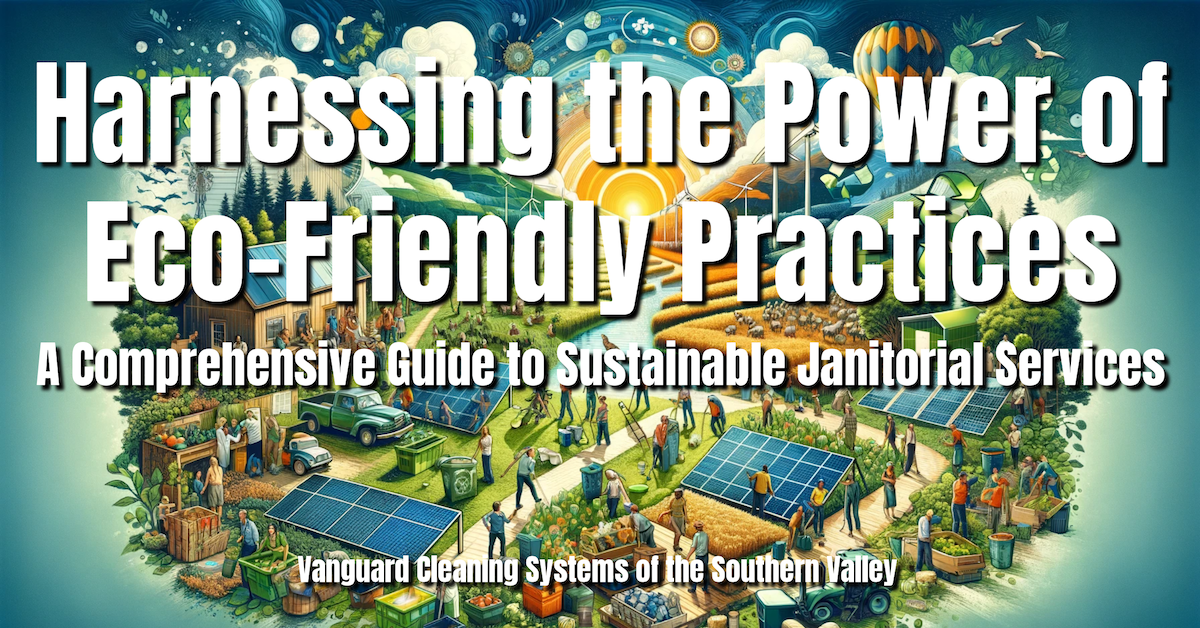Dive into the heart of sustainable cleaning as we explore the transformative power of eco-friendly products, innovative equipment, and water-wise strategies, redefining the essence of janitorial services for a sustainable future.

Setting the Stage: An Introduction to Sustainable Janitorial Innovations and Practices
Sustainable janitorial practices encompass a broad spectrum of strategies and methodologies aimed at minimizing environmental impact while maintaining high standards of cleanliness and hygiene.
These practices involve using eco-friendly cleaning agents, advanced sustainable cleaning equipment, and adequate water conservation techniques.
Additionally, they incorporate energy-efficient cleaning methods, waste reduction strategies, and the application of recycling and reusing principles in resource management.
The focus also extends to providing green training for janitorial staff and implementing responsible waste management practices, all contributing to improved indoor air quality and a reduced ecological footprint.
This approach represents a holistic commitment to environmental stewardship and health-conscious cleaning in various settings.
Critical Components of Sustainable Janitorial Practices
- Eco-Friendly Cleaning Agents: These agents form the backbone of green cleaning, emphasizing natural, non-toxic substances over chemical-based products. They are designed to reduce environmental impact while being effective in cleaning. Eco-friendly agents often include biodegradable ingredients, ensuring they do not harm ecosystems after disposal.
- Sustainable Cleaning Equipment: This category focuses on tools and machines that are energy-efficient and designed to minimize waste. Innovations include microfiber cloths that require less water and energy-efficient cleaning machines that reduce overall energy consumption. The use of such equipment not only supports sustainability but also offers long-term cost savings.
- Water Conservation Techniques: Water-efficient cleaning methods are crucial in sustainable janitorial practices. Techniques such as using concentrated cleaning solutions that require less water and employing water-saving equipment help conserve this vital resource. These practices are environmentally responsible and essential in areas facing water scarcity.
- Energy-Efficient Cleaning Practices: These practices aim to reduce the carbon footprint of cleaning activities. By using equipment that consumes less power and optimizing cleaning schedules to maximize natural light, janitorial services can significantly lower energy consumption. This approach contributes to the broader goal of reducing greenhouse gas emissions.
- Waste Reduction Strategies: Sustainable janitorial practices include methods to minimize waste generation. This involves using concentrated or refillable cleaning products, reducing packaging waste, and implementing proper waste segregation. These strategies help reduce landfill contributions and encourage a more responsible use of resources.
- Recycling and Reusing Resources: Emphasizing the principles of a circular economy, this aspect involves repurposing and recycling cleaning materials. Janitorial services can implement practices like reusing microfiber cloths and recycling empty product containers. Such measures contribute to resource conservation and waste reduction.
- Green Training for Janitorial Staff: Effective implementation of sustainable practices requires well-informed staff. Training programs educate janitorial teams about eco-friendly products, proper waste management, and energy-efficient cleaning techniques. This education ensures that staff are knowledgeable and committed to sustainable practices.
- Eco-Friendly Disposal Methods: Responsible disposal of cleaning waste minimizes environmental impact. This includes proper segregation of recyclable and non-recyclable waste and safe disposal of hazardous materials. Adopting eco-friendly disposal methods ensures that the entire cleaning process remains environmentally conscious.
- Indoor Air Quality Improvement: A significant benefit of green cleaning is enhancing indoor air quality. By using products with low or no VOCs, sustainable practices reduce airborne irritants and pollutants, creating a healthier indoor environment.
- Sustainable Cleaning Certifications: These certifications serve as benchmarks for green cleaning standards. They help identify and promote products and services that meet stringent environmental and health criteria, guiding consumers in making informed choices.
- Green Cleaning in Different Settings: Tailoring sustainable practices to various environments like offices, schools, and hospitals is critical. Each setting has unique challenges and requirements, making adaptability an essential aspect of green janitorial services.
- Eco-Friendly Cleaning Products and Services: This section recommends reputable brands and services known for their commitment to sustainability. Providing a list of eco-friendly options aids readers in making conscious choices in their cleaning endeavors.
Takeaway
The comprehensive exploration of sustainable janitorial practices underscores a crucial shift in our approach to cleaning and maintenance.
Each component, from using eco-friendly cleaning agents and sustainable equipment to implementing water and energy-efficient techniques, forms an integral part of a larger, more environmentally responsible framework.
Adopting waste reduction strategies and recycling initiatives and emphasizing indoor air quality improvement reflects a deep commitment to preserving our environment and safeguarding human health.
Moreover, incorporating sustainable cleaning certifications and adapting these practices in various settings demonstrate the versatility and necessity of green cleaning in today’s world.
By educating and training janitorial staff and recommending eco-friendly products and services, we pave the way for more informed, conscious decisions in janitorial services.
By embracing these eco-friendly approaches, we collectively contribute to a more sustainable, healthier future, setting a precedent for environmental stewardship and responsible care in every aspect of our daily lives.
If you would like more information regarding the effectiveness of high-performance infection prevention and control measures, or if you would like to schedule a free, no-obligation on-site assessment of your facility's custodial needs, contact us today for a free quote!
In Bakersfield, CA, call (661) 437-3253
In Fresno, CA, call (559) 206-1059
In Valencia, CA, or Santa Clarita, CA, call (661) 437-3253
In Palmdale, CA, or Lancaster, CA, call (661) 371-4756

